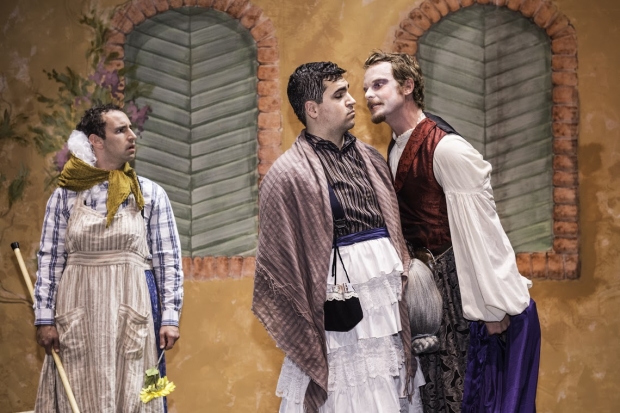Delirium's Daughters
Nicholas Korn pens a light summer romp for lovers of commedia dell’arte.

(© Michael Blase)
Delirium is the sudden onset of a state of confusion, often marked by a decreased awareness of one's surroundings. Attending Nicholas Korn's Delirium's Daughters is liable to cause a mild case of delirium in many theatergoers. Is this really a new play being presented off-Broadway at Theatre Row in 2015?, one might think. Yes it is and provided you're able to get your head straight (or gleefully abandon all rationality entirely) you'll find it a delightfully frothy summer comedy.
It all takes place outside the villa of Di Lirio (Branislav Tomich) in the imaginary Italian town of Aviano. The program notes the time as "The Past," but Sam Kusnetz' baroque pre-show music strongly suggests the early 18th century.
Di Lirio has three daughters: Marina (Stephanie Nicole Kelley), Terresa (Deanna Gibson), and Celia (Kerry Frances). All three are ready to be married. Serio (Evan Zimmerman) is in love with Terresa. Timidio (Brandon Beilis) is in love with Marina. Celia, however, has two suitors: the arrogant Pomposa (Jackson Thompson) and the wily Giovio (Nick Bombicino). Who will she (or more importantly, her father) choose? Eschewing his patriarchal prerogative, Di Lirio hands the decision off to his wife. There's only one problem: she's been dead for three years.
General hilarity springs forth from improbable situations and harebrained schemes. While the set-ups are ridiculous, Korn's script has the formality of an academic translator of the classics (which should surprise few considering he has translated and adapted seven plays and used to run his own classical theater in Cincinnati). It is written in verse (of a dubious meter) and overruns with references to heaven and angels. Still, Korn's love for the form shines through the stilted and unnatural diction, aided by committed physical performances from the ensemble.
Bombicino stands out as the show's irrepressible trickster. He wears Izzy Fields' over-the-top costumes with aplomb and sweet-talks the audience in his asides. Of the three daughters, Deanna Gibson gives the most riotous performance, twisting her face and modulating her voice with incredulity about the leaping fools all around her.
Director Kathleen Butler's staging owes as much to commedia dell'arte as it does to early TV physical comedy. Everyone acts like they're starring in an 18th century version of I Love Lucy. After getting one look at Abby Walsh's cheesy Italian backdrop, you half expect the wacky redhead to emerge in a vat of grapes.
In the end, the performances are far more memorable than the instantly forgettable story in which Pomposa is dispatched all too easily, removing any potential for further hijinx. While this seems disappointingly anticlimactic, it does allow Delirium's Daughters to wrap-up in fewer than 70 minutes, which is quite long enough for such light summer fare. And really, we never expected Celia to choose Pomposa anyway.









